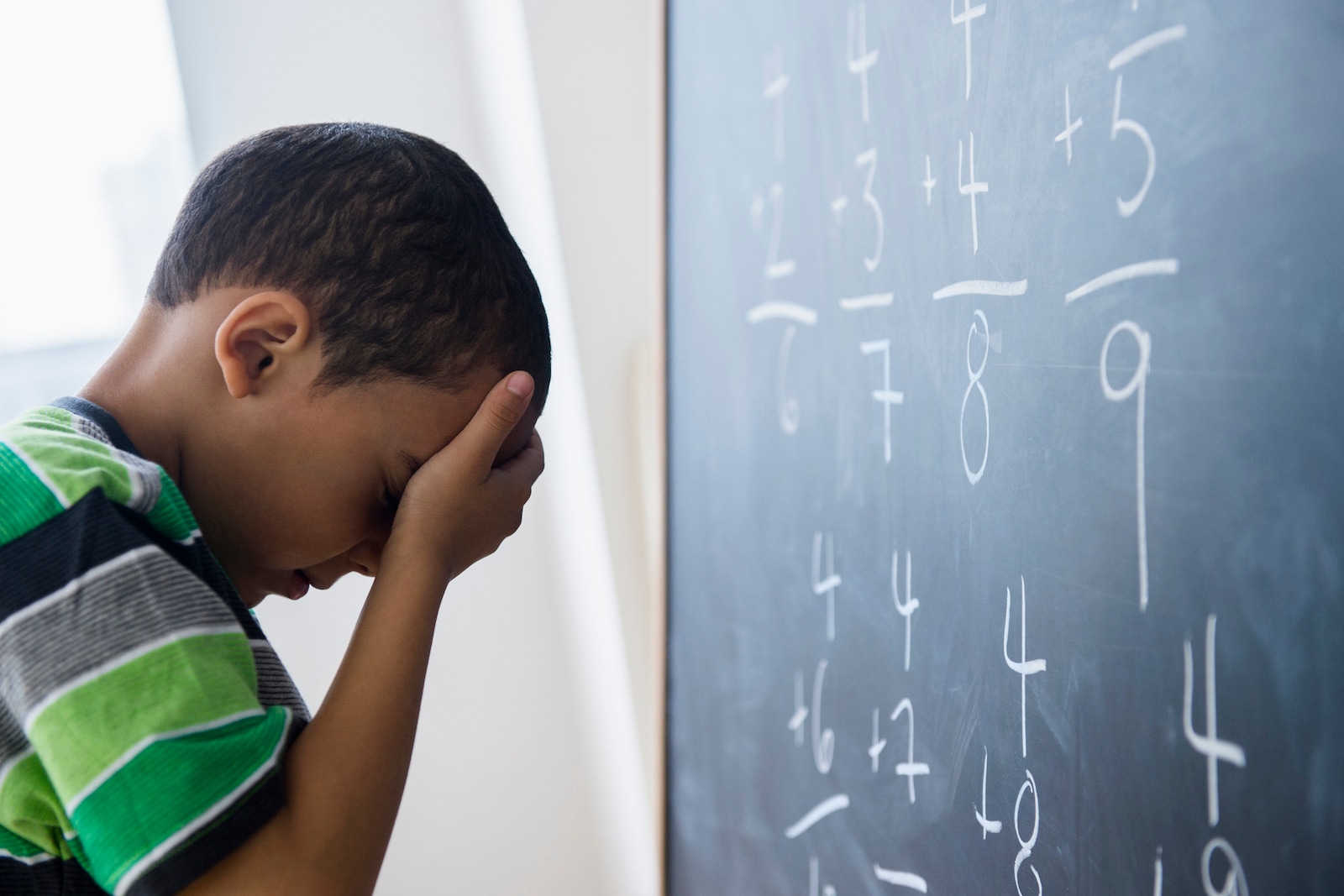In this article
While some kids can remember an entire vocabulary word list without a problem, other kids struggle to remember a handful of definitions. For the kids in the second group, should their parents and caregivers be worried? Is their difficulty retaining information indicative of a bigger problem? Or can it just be chalked up to the fact that kids learn differently? In the majority of cases, it’s the latter.
“There’s so much variability when it comes to why some kids can retain a lot of information and others not as much,” says Dr. Delene Musielak, a pediatrician and host of The Dr. Mom Show. “Some studies have shown that different factors may play a role in kids’ memories, such as gender, birth order and major life events, such as close ones dying or a relocation.”
Musielak adds that personal investment can affect memory, as well. “For example, some kids may not prioritize the foods they are eating, so if you asked them what they had for lunch yesterday, they won’t remember. But that doesn’t mean they have a bad memory. They are just focused on more ‘important’ things.”
That being said, Claire Cameron, associate professor of learning and instruction at the University at Buffalo Graduate School of Education, notes that “how well children retain information depends a lot on whether they rehearse and practice it.” When information is reviewed “more than once per week,” it will be remembered, she says.
Is your child suddenly forgetting things (or have they always)? Here’s why that may be happening and what you can do about it.
Key takeaways
- Most memory struggles in kids are normal and tied to learning styles, attention and emotional context.
- Key memory systems like short-term and working memory are influenced by stress, sleep and how information is taught.
- Parents can support learning through repetition, visuals, and tailored strategies, while watching for signs of deeper issues.
Is it normal for a child to forget things?
In short: It depends on the thing. According to Carol St. George, who holds her doctorate in education and is a professor of teaching and curriculum and director of the reading and literacies program at the Warner School of Education in Rochester, it’s easier for kids to recall things when there is a strong emotion attached — good or bad.
“The attached emotion helps file that memory and to make it retrievable,” she explains. “For example, if you ask anyone what their earliest memory is, it will be an event that was unusual, such as the birth of a sibling, an accident or a major family event.” (Additionally, St. George notes, the earliest memory a person can recall is around 2 or 3 “when they were able to have the vocabulary, their own words, to attach to the event.”)
However, recalling specific events is a different form of retention than memorizing the week’s spelling words. (Also, not most kids have strong feelings about spelling words.) Here, a mini deep-dive of how a child’s memory can affect learning:
Why can’t my child remember anything?
As Dr. Demvihin Ihyembe, clinical assistant professor of pediatrics in the section of developmental and behavioral pediatrics at the Oklahoma Children’s Hospital, explains it, memory is generally thought to involve three processes:
- Short-term memory. “This involves receiving, processing and combining information,” Ihyembe says. “It’s influenced by how much a person is paying attention to what’s going on and the capacity and duration varies by person and age. Generally, short-term memory is held for about 15-30 seconds before it starts to decay.”
- Long-term memory. This has unlimited duration and capacity, and it’s stored in two ways:
- Episodic. “This is information that’s linked to emotions and significant events, such as a special trip to the zoo,” Ihyembe says.
- Semantic. “This is the memory used for learning at school, as this holds factual information.”
- Recall. “This involves retrieving information either from our short- or long-term memory system,” Ihyembe explains. “Sometimes, we can pull out the information fast, other times we may need tricks to remember, for instance singing the ‘seven days has September…’ song to remember how many days are in a month.”
Finally, there’s another type of “memory:” working memory.
“This is very short-term memory — a few seconds — and is like a quick mental sticky note that helps people keep track of what they’re doing while they work through a task,” Ihyembe says, adding that working memory also helps the brain organize new information to be stored more permanently.
What does all of this mean? While, technically-speaking, semantic memory is associated with school-learning, how well people remember information is dependent on how well all these systems work.
For example, when a child is having a hard time paying attention and remembering things at school, it may be a result of the following, according to Ihyembe:
- Short-term memory. Only part of the information gets in.
- Working memory. A child is struggling to find “the sticky note” that briefly holds information.
- Recall. Only part of the information went in, so only part of it comes out or they are too busy “rifling in the junk drawer.”
Additionally, all of these systems contribute to executive functioning, which the group of skills required to:
- Pay attention.
- Start, continue with and complete a task.
- Keep track of the task at hand.
- Store and organize information.
- Retrieve information quickly and accurately.
- Plan.
- Manage emotions.
In simpler terms: If you have an obviously bright child, who seems to have a hard time remembering what they’re taught, it very well may be an issue with executive functioning.
Other potential causes of a child suddenly forgetting things
According to Cameron, the following can also affection information retention:
- Stress.
- Sleep.
- Nutrition.
Dr. Musielak also adds that “some studies have shown that girls tend to remember situations longer than boys other studies have shown that the first born child may also have a better memory.” That said, these aren’t “set in stone.”
With so many factors affecting information retention, Cameron cautions against “thinking in ‘types’ of children in regards to memory.”
“Some children under some circumstances are going to retain information better than others — perhaps because they had good sleep, ate well, and the information is highly meaningful for them,” she says.
It may not be your child’s memory; it may be how information is being presented
Kids all learn differently, and according to Dr. Jean Barbre, author of “Supporting Children’s Mental Health and Wellbeing: A Strength-Based Approach for Early Childhood Educators,” in order for school to really “work” for an individual, learning should be custom-tailored. “The majority of kids are visual learners, but some, more so boys, are kinesthetic learners, which means they learn by doing,” Barbre explains. “Still some will learn through art or drawing or songs — learning should be adapted to their strengths.”
In other words: Your child may not be remembering things because information isn’t presented in the right way to them. “It’s important teachers and parents have a good understanding of how kids experience learning — a great teacher will present things in multiple ways,” she says. “And when parents have a grasp on their child’s strengths, they can work with that. For instance, instead of didactically going through vocabulary words, you may need to make up a song.”
For parents and caregivers who are more concerned about their children not retaining instructions they’re given, again, think about how you’re presenting them.
“Young children benefit from dialogic talk, meaning you and your child both ask questions and respond with answers,” St. George says. “Rather than merely giving demands, talk with your child and explain the reasons for a request. So instead of saying things like ‘close the door, put on your coat, pick up your toys,’ opt for: ‘Can you help me close the door because there’s a draft and it’s cold?’ ‘Let’s put on your coat so we can go to the store and buy our food.’ ‘Please pick up your toys so no one trips on them.’”
Lastly, if a child under 5 is having a hard time completing tasks, determine whether you’ve given too many. “Very young children shouldn’t be given more than one to two things to remember,” says Cameron. “Children 5 and older who are typically developing can be given three or more pieces of information or steps at a time.”
How can I help my child retain information?
There are a number of ways parents and caregivers can help kids retain information (with first and foremost being determining the type of learner the child is). Here’s what else the experts suggest:
Practice, rest
“If adults want children to remember certain information, they need to have children practice that particular information regularly and have rest periods in between the learning,” Cameron says. “For instance, practice information on Mondays, Wednesdays and Fridays, taking the other days off. When we don’t rehearse information or practice it regularly, the neural connections weaken.”
Have a calm space
“Create a learning environment that is calm, not stressful, since stress and trauma interfere with the formation of memories,” Cameron suggests.
Get creative
When you know how your child learns best, tailor their learning — and make it fun. “Instead of having kids read vocabulary words off index cards, pull three or four out and make a story out of it,” Barbre says. “Or tell them that you’re going to use a particular word today and that they should, too.”
“Offering rhymes, word play and songs are great memory enhancers,” adds St. George. “You can Google or YouTube songs to master memorizing multiplication facts, for example.”
Play games
“Games such as Concentration and games where one person adds an item or event, and the next person has to repeat the previous item(s) and add another — such as the Bear Went Over the Mountain — are great fun activities to help develop memory, just keep the focus on fun so as not to frustrate or build anxiety,” St. George says. “There are apps that present modern versions of these games.”
Zero in on repetition
“Repetition is key,” says St. George. “Having the child repeat back so as to check for understanding, and so it makes sense to the child is a good strategy. Rehearsal, when you repeat to someone or even yourself whatever it is you’re trying to remember, is a useful tool for some children.”
Chunk it
“Try breaking information into smaller parts; teachers call it ‘chunking’ it, and ‘Velcro’ new information to something they already know,” St. George suggests. “This means they associate the new idea to something already concretely in their memory.
“Try breaking information into smaller parts. Teachers call this ‘chunking’ it.”
— Carol St. George, director of reading and literacies program
Provide visuals
“If you want your child to remember to take their house key to school, put a visual of a key on their bathroom mirror so they see it as they brush their teeth, or place a photo of the cat with their food and a clock showing a specific time, if you want your child to remember to feed a pet at a certain time,” St. George says. “Providing visuals and encouraging your child to visualize is helpful when it comes to memory. As you’re telling a story, encourage the child to make a picture of the story’s characters and actions in their mind.”
Choose screen time wisely
“Though virtual learning can make it difficult, try to limit screen time to less than two hours a day,” says Musielak. “Also, make sure the screen time exposes them to material that they can learn from, not just random and brainless shows.”
When should I be concerned about my child’s memory?
Barbre notes that learning “red flags” generally become obvious around second grade. “Many kids can sort of fake their way through kindergarten and first grade, but second grade is a pivotal year for cognitive abilities, abstract thinking and pulling ideas from the past,” she says. “Drawing on reading, math and a child’s social and organizational skills, second grade is typically the year bigger issues can become blatant.”
According to Musielak and Barbre, if a child consistently struggles with the following, it may be a sign it’s time to speak with a professional:
- Organizing their backpack, desk, etc.
- Abstract thinking. “Kids should be able to start planning around this age,” says Barbre. “Thinking shouldn’t be so linear.”
- Starting a project.
- Making/keeping friends.
- Executive functioning.
- They need constant reminders for the majority of things.
- Decrease performance in school or sports.
- Forgetfulness is causing them stress, anxiety or lack of confidence.
Before approaching your child’s pediatrician, Cameron suggests talking to the school psychologist or similar as a first course of action. “ADD and ADHD diagnoses may be appropriate, but often what needs to change is the environment, not the child,” she says. “For instance, environments need to be more predictable, less stressful, and the child’s needs — such as sleep and nutrition and loving relationships — need attention.”





